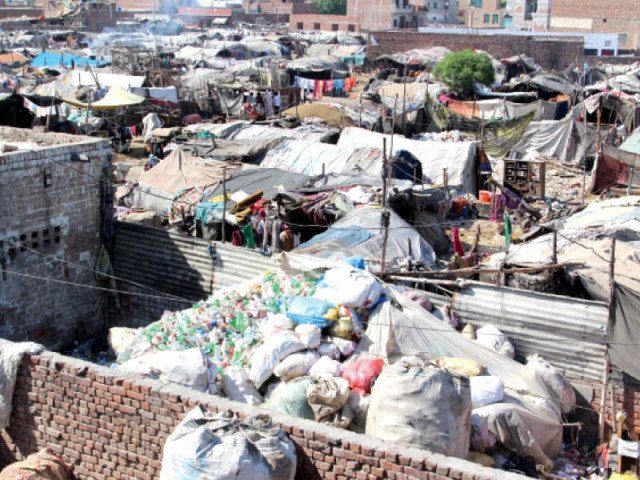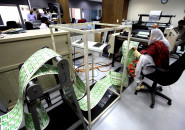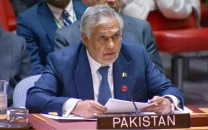Trash trade: Garbage collectors fear being pushed out of their livelihood
LWMC acknowledges their service in recycling but says their way of collecting garbage is no longer feasible.

A view of a squatter settlement from above reveals heaps of sorted and semi-sorted recyclable materials. Massive piles of plastic bottles and cardboard boxes are a common sight. Used clothes are washed and hung on wires crisscrossing the area. PHOTO: ZEHRA HASHMI/EXPRESS
As garbage moves across the city and some areas are cleansed of it, heaps of it come to colour the landscape in informal settlements comprising jhuggis – patched tents assembled to serve the inhabitants’ needs. Nasreen Bibi lives in one such squatter settlement in Johar Town.
A collage of plastic, glass and cardboard, among other unidentifiable materials, makes the settlement stand out. Almost all 300 residents collect garbage for a living and retrieve and sell recyclable material.
“They now want to take away the garbage that we have been picking for over 20 years,” says the middle-aged Nasreen, who collects garbage from houses in Bahar Colony, some seven kilometres away.
‘They’ are the Lahore Waste Management Company (LWMC) and the two Turkish companies that the LWMC awarded the waste management contract to in March 2012. Door-to-door collection for all of Lahore is in the pipeline. It has started in some areas such as Bahar Colony near Kot Lakhpat, and in Q Block of Model Town extension and fuelled apprehensions among the garbage collectors that they would be stopped from working in the area.

According to Nasreen, the 7 am time set by the Turkish companies to put garbage outside the houses does not suit most residents. She says the Turkish companies have not directly stopped them from collecting waste from people’s homes, but when they go on their donkey carts to drop off trash to the dumpsters they are confronted by LWMC employees.
The ominous and much feared figure of darogha figures prominently in the narratives of many garbage collectors. Zulfiqar Ali who works in Q Block, Model Town extension, explains that these area supervisors harass them and demand between Rs500 and Rs1,000 as bribe. He says that sometimes they are also threatened with violence.
According to Muhammad Amanat, a leader of an organisation of garbage collectors, around 200,000 people collect trash from houses in Lahore. In the Niaz Beg locality near the Lahore-Islamabad Motorway, there is another squatter settlement of around 2,000 people engaged in the same occupation. Amidst a sea of jhuggis, Irfan Shahid, a garbage collector, is feeding his well-cared-for donkey, a crucial asset for the household’s livelihood. Irfan, known as Bhola, says there are four or more family members working per donkey-cart to collect and bring garbage to the site.

Shahzad Ali, who also collects garbage from houses in Q Block, Model Town, explains that although they receive a monthly charge from the houses they cover, they earn almost as much if not more by selling recyclable material. Ali collects from 150 houses that pay him Rs70 each (Rs10,500 a month) and makes another Rs300-400 per day by selling recyclable items.
The garbage collectors at the Niaz Beg settlement describe in both fearful and dismissive tones the posters that have cropped up in the areas that they operate in, announcing that ‘the company’ will soon be handling all door-to-door collections.
Aisha Nazir, the LWMC operations assistant manage, says the public response to the door-to-door collection has not been too enthusiastic so far. She says in places like Bahar Colony and Q Block, Model Town extension, the companies contracted by the LWMC collected only 25 per cent of the waste from homes.

Muhammad Yasin, who has a juice shop near the Q-Block flats in Model Town extension, says he has seen the posters saying ‘the company’ would start collection but he has never seen anyone collect the garbage. Amina Bibi, a resident of Q-Block flats, says her children have been throwing the house’s waste in the neighbourhood skip but the skip disappeared two months ago. Zareena Shahid, a resident of Bahar Colony, said the company employees come to collect the waste too early in the morning, and do not pick it up from inside the house.
The garbage collectors from the squatter settlements have contemplated negotiating with the two Turkish companies to employ those who are already doing this work.
However, LWMC Communications Deputy Manager Shafqat Rasool says it is not feasible to knock on every door to pick up the garbage from inside people’s homes.
But formal employment is not the core problem for the garbage collectors, says Zulfiqar in the Niaz Beg settlement. “The Rs10,000 that the goras [from the Turkish companies] might offer will do nothing. They are taking away our livelihood: the trash itself. Once the Turkish companies take over they will not let us take the waste we need to feed our children,” Zulfiqar says, gesturing to his five children separating cartons from bottles from organic material from clothes from other miscellaneous items.
Nawab Bibi, 67, has been a garbage collector for 40 years. She says, “What will we do if the company doesn’t allow us to take the trash? Our only options are to beg, steal or starve to death.”
“I think this is a new strategy. Instead of pushing the poor and the elite’s dirt which we carry towards the outskirts of the city, they are simply going to take away our livelihood and hope that we will just leave. What they don’t realise is that we don’t have anywhere to go”, Zulfiqar says.
Nazir says that since the garbage collectors are officially not supposed to be there, their trash is not supposed to be in the LWMC skips. A darogha in Barkat Market, who requests anonymity, says that at times they throw too much waste for a skip to handle.
Nazir concedes that the garbage collectors are “a form of support”, given the LWMC’s shortage of resources. She says these garbage collectors are already “in the loop”, as the daroghas have given them a time by which they must throw their waste into the skips. But they should be officially issued cards to collect the waste, Nazir says. That way they can also be given trainings and awareness sessions to protect them from hazardous waste.
Rasool says: “We are thankful to them for contributing to recycling some of the waste.” The LWMC has plans for recycling in the future and especially encouraging people to do so at their homes, but no one is separating waste in any significant way across the city at the moment except for these garbage collectors, he says.
The waste management companies need to prevent people from picking through waste due to the hazardous material in the garbage, says Rasool.
Published in The Express Tribune, May 2nd, 2014.



















COMMENTS
Comments are moderated and generally will be posted if they are on-topic and not abusive.
For more information, please see our Comments FAQ